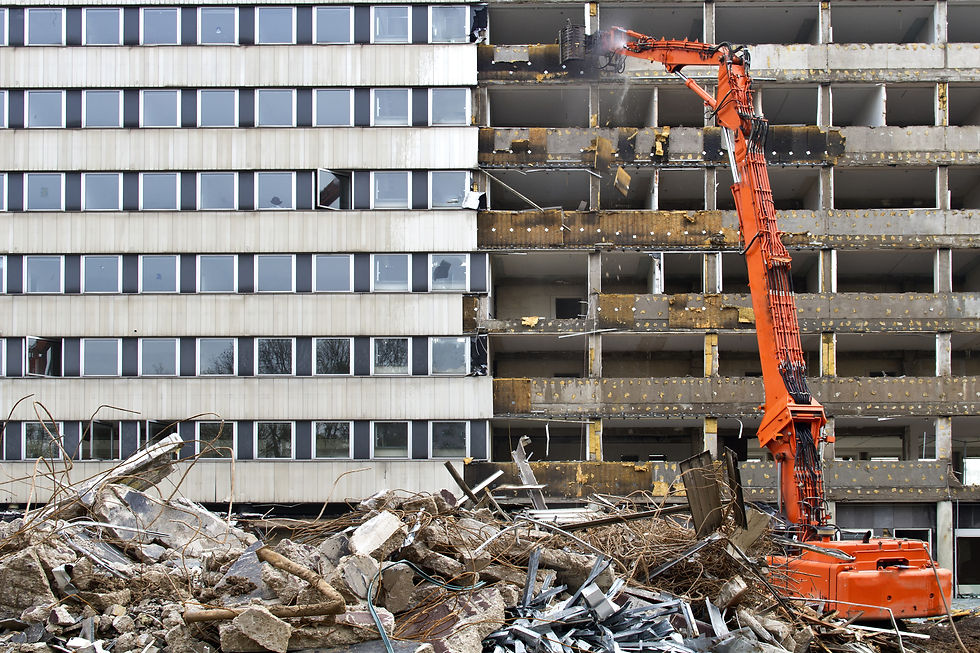Innovations on Demolition Services in Boston : The Latest Techniques and Technologies
- Oliver Owens
- Mar 20, 2024
- 3 min read
Updated: Aug 15, 2024
Demolition, once a rudimentary and brute force operation, has evolved into a sophisticated and highly technical field. Modern advancements in demolition techniques and technologies have not only enhanced efficiency and safety but have also minimized environmental impacts. This blog explores the latest innovations reshaping the demolition industry.
High-Reach Excavators
High-reach excavators have revolutionized demolition, especially for tall structures. These machines, equipped with extended arms, can reach heights that traditional equipment cannot, allowing for precise and controlled demolition from the top down. This method is particularly useful in urban settings where minimizing debris and dust is crucial.
Implosion Techniques
Controlled implosion is a method where strategically placed explosives bring down a structure in a matter of seconds. Demolition services in Boston use this technique requires meticulous planning and precise execution to ensure the building collapses inward, reducing damage to surrounding structures. Advances in computer modeling and simulation have enhanced the accuracy and safety of implosions, making them a preferred choice for large buildings and stadiums.

Robotics and Remote-Controlled Equipment
Robotics and remote-controlled equipment are becoming increasingly common in demolition, offering enhanced safety and precision. Robots can access hazardous or confined spaces that are dangerous for human workers. They can perform tasks like cutting, drilling, and breaking with great accuracy, reducing the risk of accidents and increasing efficiency.
Selective Demolition
Selective demolition, also known as deconstruction, involves carefully dismantling a building to preserve and recycle specific materials. This method contrasts with traditional demolition, which focuses on total destruction. Selective demolition is not only environmentally friendly but also cost-effective, as salvaged materials can be reused or sold. Advances in tools and techniques have made selective demolition more viable and efficient.
Advanced Recycling Technologies
Recycling has always been a part of demolition, but new technologies are taking it to the next level. Advanced sorting and processing equipment can now separate materials more effectively, allowing for higher recycling rates. Innovations in crushing and screening equipment have improved the quality of recycled aggregates, making them suitable for use in new construction projects.
Drones and 3D Mapping
Drones equipped with high-resolution cameras and sensors are transforming site surveys and inspections. They provide real-time data and detailed 3D maps of structures, aiding in planning and monitoring demolition projects. This technology enhances safety by reducing the need for human inspectors to enter potentially dangerous sites.
Building Information Modeling (BIM)
Building Information Modeling (BIM) is a digital representation of a building's physical and functional characteristics. In demolition, BIM is used to create detailed 3D models that help plan the demolition process. It allows for better visualization, identification of potential issues, and collaboration among stakeholders. BIM also aids in managing and tracking materials for recycling and disposal.
Dust Suppression Systems
Dust suppression is a significant concern in demolition, particularly in urban areas. Innovations in dust control include advanced misting systems that create fine water droplets to capture dust particles. These systems can be automated and controlled remotely, ensuring effective dust management with minimal manual intervention.
Noise Reduction Techniques
Noise is another environmental concern in demolition. New technologies in noise reduction include using quieter machinery, sound barriers, and advanced cutting techniques that produce less noise. These innovations help mitigate the impact of demolition on surrounding communities.
Sustainable Demolition Practices
Sustainability is becoming a key focus in demolition. Techniques such as selective demolition, advanced recycling, and the use of eco-friendly machinery reduce the environmental footprint of demolition projects. Sustainable practices not only benefit the environment but also enhance the reputation of demolition companies.
The demolition industry is continually evolving, driven by technological advancements and a growing emphasis on sustainability and safety. By adopting these innovations, demolition contractors can deliver more efficient, safe, and environmentally responsible services.
.png)








Comments